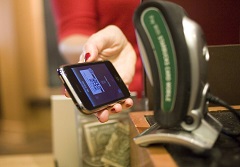NXP Semiconductors has announced a new passive solution for NFC that it hopes will bring new and intuitive applications for the technology.
The NTAG I²C tag chip combines a contactless NFC interface with a contact inter-integrated circuit (I²C) and on-board memory, allowing for new kinds of NFG interactions between home appliances, wearable tech and home automation, claims the company.
One example given is that NFC-enabled smartphone users could use their device as a remote user interface for their home electronics, rather than having to rely on expensive touchscreen appliances or Wi-Fi connectivity.
NXP said the NTAG I²C is optimized for very low-power operation and includes an automatic power-up that detects when a compatible device is in range, avoiding mobile battery being drained when not in use.
It added that the technology is particularly suited to wearable tech and is compatible with all NFC-enabled devices.
The news comes on the same day the Dutch chipmaker is rumoured to be working with Apple to bring NFC technology to the next iPhone.
The Financial Times cited speculation that NFX would manufacture Apple’s NFC chip, ahead of the new iPhone’s launch on September 9.
Rutget Vrijen, VP and General Manager at NXP Semiconductors, said the new solution takes NFC “beyond its traditional ecosystem”.
He added: “It will now become possible to use the high intuitive UI on your smartphone to program a washing machine, exchange data with an exercise bike or wristband, and download specific cooking recipes to your microwave oven.”
According to Ross Bannatyne, NXP’s General Manager of Product Line Mass Market Microcontrollers, there is an “increasing number” of smart home, health and appliance applications in development based on LPC microcontrollers and NTAG I2C tags.
He commented: “The ease of use of these designs is enhanced significantly by the NFC-enabled smart interface.”
Bannatyne and his team may have their work cut out for them: earlier this month, research agency Gartner found NFC had bottomed out in a “trough of disillusionment” in its annual Hype Cycle for Emerging Technologies, caused by waning interest in the technology.
Read more:
Samsung leaps ahead of Apple, Google in IoT race with SmartThings buy
Orange taps NFC, Bluetooth for new healthcare deal



